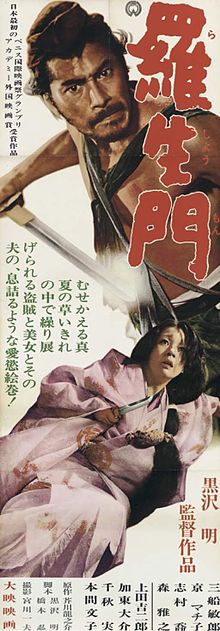Rashomon (movie)
| Rashomon | |
|---|---|

Original Japanese poster from 1962 re-release
|
|
| Directed by | Akira Kurosawa |
| Produced by | Minoru Jingo |
| Screenplay by |
|
| Based on | "In a Grove" by Ryūnosuke Akutagawa |
| Starring | |
| Music by | Fumio Hayasaka |
| Cinematography | Kazuo Miyagawa |
| Edited by | Akira Kurosawa |
|
Production
company |
|
| Distributed by | Daiei Film |
|
Release date
|
|
|
Running time
|
88 minutes |
| Country | Japan |
| Language | Japanese |
| Budget | $250,000 |
Rashomon (羅生門 Rashōmon?) is a 1950 Japanese jidaigeki film directed by Akira Kurosawa, working in close collaboration with cinematographer Kazuo Miyagawa. It stars Toshiro Mifune, Machiko Kyō, Masayuki Mori, and Takashi Shimura. While the film borrows the title and setting from Ryūnosuke Akutagawa's short story "Rashōmon", it is actually based on Akutagawa's short story "In a Grove", which provides the characters and plot.
The film is known for a plot device that involves various characters providing alternative, self-serving and contradictory versions of the same incident. Rashomon marked the entrance of Japanese film onto the world stage; it won several awards, including the Golden Lion at the Venice Film Festival in 1951, and an Academy Honorary Award at the 24th Academy Awards in 1952, and is now considered one of the greatest films ever made.
The film opens on a woodcutter (木樵り; Kikori, played by Takashi Shimura) and a priest (旅法師; Tabi Hōshi, Minoru Chiaki) sitting beneath the Rajōmon city gate to stay dry in a downpour. A commoner (Kichijiro Ueda) joins them and they tell him that they have witnessed a disturbing story, which they then begin recounting to him. The woodcutter claims he found the body of a murdered samurai three days earlier while looking for wood in the forest; upon discovering the body, he says, he fled in a panic to notify the authorities. The priest says that he saw the samurai with his wife traveling the same day the murder happened. Both men were then summoned to testify in court, where they met the captured bandit Tajōmaru (多襄丸), who claimed responsibility for killing the samurai and raping his wife.
...
Wikipedia
